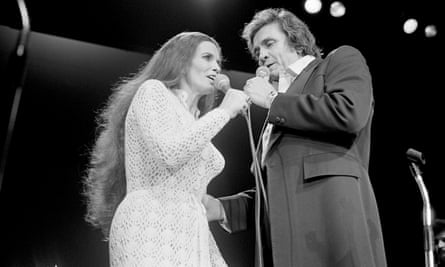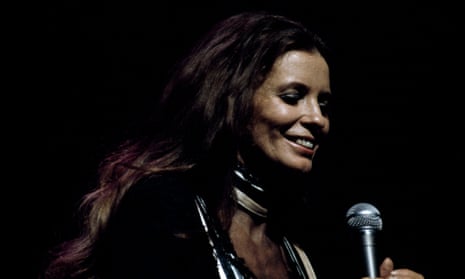Crazy was most famously sung by Patsy Cline but written by Willie Nelson. I Will Always Love You was most famously sung by Whitney Houston but written by Dolly Parton. Ring of Fire, a love song reeking of sulphur and damnation, took off when Johnny Cash sang it on his 1963 album Ring of Fire: The Best of Johnny Cash.
But it was written by his wife, June Carter Cash, a singer, songwriter, musician, actor and author who spent much of her career in his shadow. “I feel aggrieved on her behalf,” says Kristen Vaurio, 46, director of a new documentary, June, which shines a light on one of music’s hidden figures.
“There are a lot of people who are like, oh no, she couldn’t have written that. This is a hard sell in Nashville but I feel like it’s the most recognisable country song there is in the world. I think because she was a woman, people didn’t want to let her have it.”
Vaurio’s film contains previously unseen archival material and interviews with family and friends as well as Willie Nelson, Dolly Parton, Emmylou Harris, Kacey Musgraves and Reese Witherspoon (who won an Oscar for her role as Carter Cash in the 2005 film Walk the Line). It offers a reassessment of the legacy of a woman who received less recognition as a pioneer than Loretta Lynn and Tammy Wynette and still does not have a place in the Country Music Hall of Fame.
June Carter was born in Maces Spring, Virginia, in 1929, and was at the microphone by the age of 10. Her mother, Maybelle Carter, had a family music act with her cousin Sara Carter and Sara’s husband, AP Carter. They made some of the first country music recordings.
Speaking from Los Angeles, Vaurio says: “She came from Poor Valley at the base of Clinch Mountain, Maces Spring, and that place was always a very spiritual home for her. She spent so much of her life on the road, but having that place as home and those songs that she sang, and those Carter family songs, are very much rooted in that place.”
The family act broke up but mother and daughters June, Helen and Anita continued as Mother Maybelle & the Carter Sisters, with June playing autoharp and singing comic numbers with an exaggerated hillbilly accent and a wide toothy grin. From 1939 the sisters starred in a radio show on XERA in Del Rio, Texas, that reached far across America and Canada. They went on to become staples of the Grand Ole Opry country music show in Nashville.
Vaurio continues: “She came from – still to this day – a family of remarkable women. I don’t think that there’s another group of women like that – geniuses, business geniuses – and they just did it. Even though it was hard, they made it work.”
June’s effort to have a solo career ran into attitudes of the day in which a woman in a travelling show was referred to as a “girl singer”. Vaurio adds: “They also weren’t wanting to sign women to recording contracts because they didn’t think that women would sell. She was fighting against that.
“Everybody exists in their time and place and that was the time and place that she was in. She was in Nashville and trying to make it on her own in the 50s. She probably wouldn’t have called herself a feminist but she lived it.”
June and country singer Carl Smith became the “it” couple of their day at the Grand Ole Opry. But their marriage ended in divorce just four years later – a scandal at that time. Their daughter, Carlene Carter, recalls in the film that Smith claimed years later June never loved him, only the idea of him.
Carlene, one of the executive producers of the new documentary, says in a Zoom interview from Nashville: “I was so small when they split up, I have very few memories of them even hanging out in the same room together. Not that they didn’t like each other.
“There was a lot of hurt there for mom for a lot of years but she never talk bad about my daddy. They had a chemistry that was undeniable in their working career and they fit well in that regard. He wanted a different life than she did. He always said country music afforded him the luxury to be what he wanted to be, which was a cowboy.”
The Carters toured with Elvis Presley in the 1950s. Carlene, 68, often asked her mother whether she slept with Elvis but June would blush, giggle and deny it. “She always said Elvis was a nice young man and he had a good heart and she said he was so talented and was tormented – the usual thing that superstars end up having, that drives them in some way.
“But they were great friends. and he wasn’t past coming to our house when I was a baby and wanting a sandwich and nobody would be in there except the nanny and me, and we’d be asleep, and Elvis would be downstairs making a sandwich – probably peanut butter and bacon.”
June moved to New York in the late 1950s to study acting at the suggestion of the director Elia Kazan, who had seen her perform while scouting Tennessee for film locations. She married Edwin “Rip” Nix, a former football player and police officer, in 1957. They had a daughter, Rosie Nix Adams, but divorced in 1966.
In 1961 the Carters went on the road with Johnny Cash. Helen and Anita stepped away to raise families but June stayed on. When Cash spiralled into a drug addition and onstage outbursts, June intervened, hunting down his pills and throwing them away. She helped him find counselling and urged her daughters to pray for him.
In his autobiography, Cash described how June stuck with him through years of substance abuse. He wrote: “June said she knew me – knew the kernel of me, deep inside, beneath the drugs and deceit and despair and anger and selfishness, and knew my loneliness. She said she could help me ... If she found my pills, she flushed them down the toilet. And find them she did; she searched for them, relentlessly.”
June wrote Ring of Fire about falling in love with Cash despite his self-destructive behaviour. Carlene witnessed its creation. “I can remember when she was working on that song and then she played it with the autoharp and then tried the guitar,” she recalls.
“She made intricate notes about stuff and she ended up having a party one day with some friends and [singer and songwriter] Merle Kilgore was there, and he had been encouraging her with the song. She played it to him and he helped spur her along with it a little bit. But she wrote it and I remember running through the house and going to all Mom’s friends, ‘My momma’s written a new song!’ But we didn’t know it was a hit yet. We just thought it was going to be a hit.”
Cash recorded the song, officially credited to June and Kilgore, and it topped the US country chart in 1963. Carlene, herself a country singer and songwriter, comments: “Maybe people just look down their nose at her. ‘A woman can’t write a song like that.’ Well, wanna bet? Heartbreak Hotel – Mae Boren Axton, she sure did. There’s a lot of great women songwriters and Maybelle and Sara and the Carters, writing songs was the absolute foundation of the music of all of it for them.
“The big piece of advice that Mommy gave me was that there are no rules. You’ll know it’s a good one when you get it. ‘If you can just write one simple little song like the one I did for Johnny Cash, Ring of Fire” – she bursts into laughter – “I know she probably had her tongue in her cheek a little bit when she’s saying that to me.
“But she was dead serious, she’d look me right in the eye and tell me things like that, and I listened to her. She also was my biggest fan. She followed me all over the place and was always lifting me up and telling everybody about me. She was proud of her kids and proud that we were going to carry on in whatever way we did. That was important to them to carry on the music.”
In 1961 June turned down an offer to work on a variety show, agreeing instead to tour with Cash for $500 a week. Having both divorced in 1966, they got married two years later after he proposed to her on stage in London, Ontario, Canada. They had a son, John Carter Cash, in 1970.
Carlene says: “June was John’s absolute thing ever on the planet. She’d walk in a room and he would light up. He missed her; he called me and said, ‘Where are you and your momma at?’ I’d say, ‘Oh, we’re in shopping’ and he’d be like, ‘When’s she coming home? I just want to see June Carter.’
“It was very sweet and they were very much in love and my sister and I got to see what that looked like, for my mom to actually be in love with somebody that adored her and that she adored, and they had great mutual respect for each other. Everybody knows it was not easy all the time – definitely not – but for us girls, and for my little brother when he came along, we saw it on a daily basis between them. There were a few hiccups but that’s normal.”

June performed with Cash on record and on stage with songs including Jackson and If I Were a Carpenter, which won Grammy awards in 1967 and 1970, respectively. Among their duets were It Ain’t Me Babe in 1964 and If I Had a Hammer in 1972. In later years they often appeared with the evangelist Billy Graham. Cash’s addiction demons resurfaced, putting strains on the marriage until he went into rehab.
June’s occasional acting roles included the part of Robert Duvall’s mother in the 1997 film The Apostle. In 1999 she released an acoustic album, Press On, her first in a quarter-century, following her career from its beginning through her then 31-year marriage and collaboration with Cash. Archival footage of the making of Press On forms the spine of the Paramount+ documentary.
Carlene recalls: “One of the hardest things for June in the end was that she had never not been on the road. She had always been an entertainer and done it so the fact that she came back and made a record and went out and played some shows and got recognition and won a couple of Grammys in her 70s is hope for all of us women. I was so proud of her.”
When June died in 2003, of complications from heart surgery at the age of 73 with Cash at her bedside, obituaries produced by the Associated Press, Guardian, New York Times and others all mentioned her more famous husband in the first paragraph. But Vaurio hopes her film will disrupt that narrative.
She says: “I want nobody to ever say June Carter Cash and then say who, Johnny’s wife? I want her to be known as her own artist. She went out burning and that to me is such an inspiration and that’s a great lesson that anybody can take from this.”
Carlene adds she hopes the documentary will convey “the absolute total awesomeness of my mother, the whole package, flaws and diamonds. All of it is just so interesting and never dull moment, y’all.”
June is now available on Paramount+

Comments (…)
Sign in or create your Guardian account to join the discussion